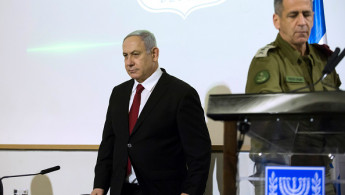Israeli army at loggerheads with Netanyahu's new far-right coalition
Members of Benjamin Netanyahu’s incoming far-right government found themselves at loggerheads with the Israeli army on Tuesday, in a new dispute over control of the occupied West Bank.
Chief of Staff Lt. general Aviv Kochavi spoke to the incoming prime minister in a private telephone call on Monday over concerns that civilian ministers are being awarded powers previously held by the army.
Kochavi raised concerns with Netanyahu that civilian control over the West Bank would lead to greater bloodshed, according to Hebrew language media reports.
Currently, control of the West Bank comes under the auspices of the Israeli army. This year has already been the deadliest for Palestinians living in the occupied West Bank since 2005.
Kochavi’s comments were aimed at incoming ministers Belazel Smotrich and Itamar Ben-Gvir, both under scrutiny for their extremist views, and both in line to gain influence over Israeli control of the occupied Palestinian Territories.
On Tuesday, Smotrich hit back, saying the military leader had “grossly intervened” in Israeli politics by requesting that the army be involved in decisions related to civilian authority.
He then accused Kochavi of laying the groundwork for political office.
"Whoever wants to keep the IDF unified as the army of the people, in consensus and outside of politics, needs to legislate a minimum ten-year cooling off period for chiefs of staff," Smotrich added.
Currently, generals are obligated to wait a minimum of three years before running for public office in Israel.
“There is real concern that the conduct of a chief of staff who wishes to join political life will be geared towards scoring points with the public that will assist him politically," Ben-Gvir also said on twitter.
Itamar Ben-Gvir, head of the Jewish Power party, will have authority for police as security minister while Bezalel Smotrich's Religious Zionism party will have broad authority to allow the expansion of illegal Jewish settlements in the West Bank.
Netanyahu's extremist bloc of right-wing and religious parties won a clear victory in parliamentary elections last month, but the veteran leader has had a harder time than expected in finalising deals with his partners.
Despite campaigning together, Netanyahu has struggled to meet the demands of his allies, who have demanded a significant slice of power in exchange for their support.





 Follow the Middle East's top stories in English at The New Arab on Google News
Follow the Middle East's top stories in English at The New Arab on Google News


